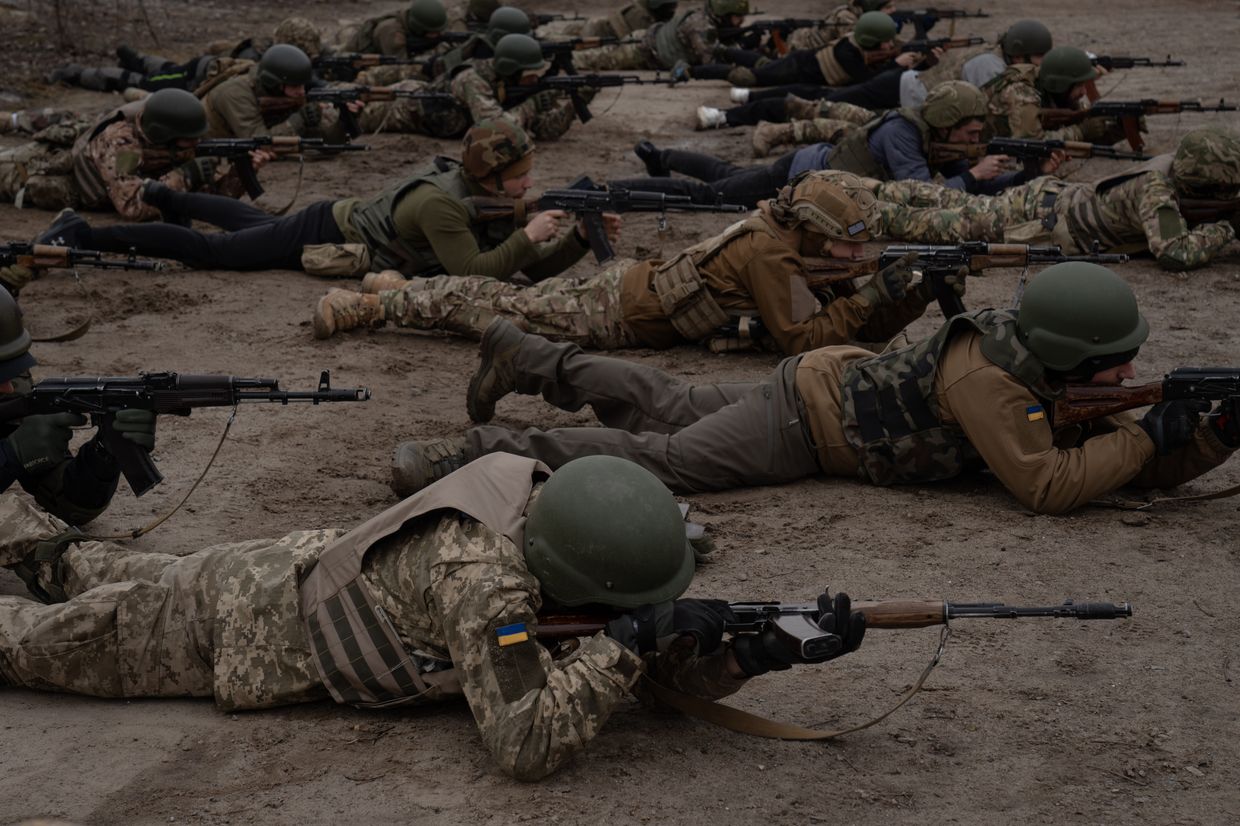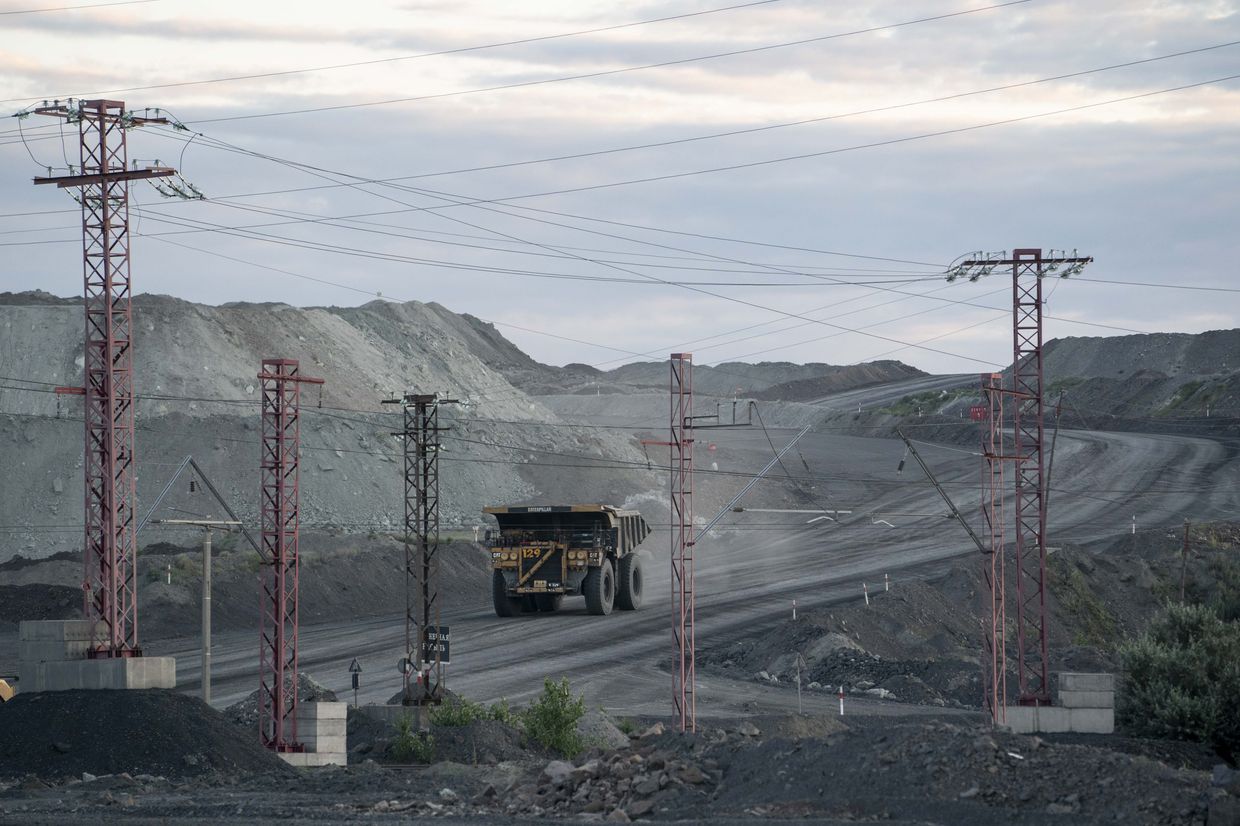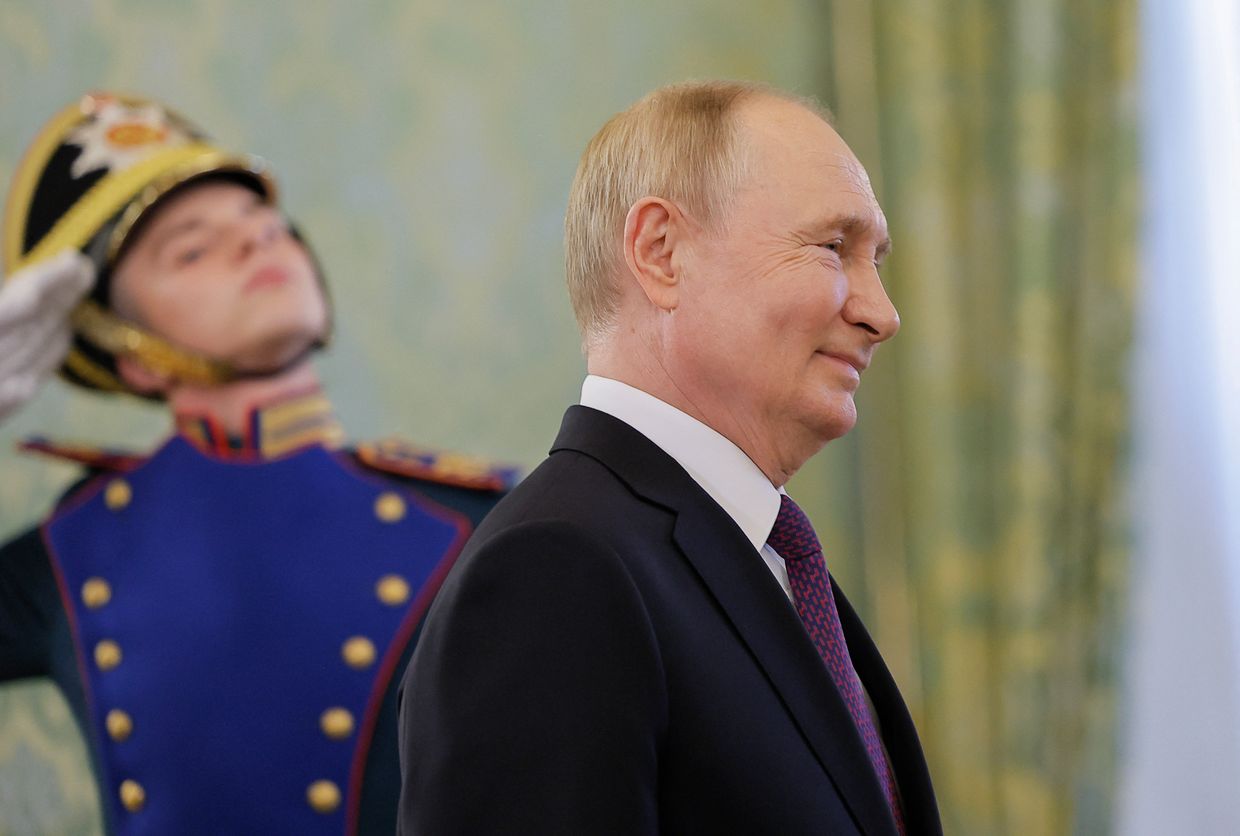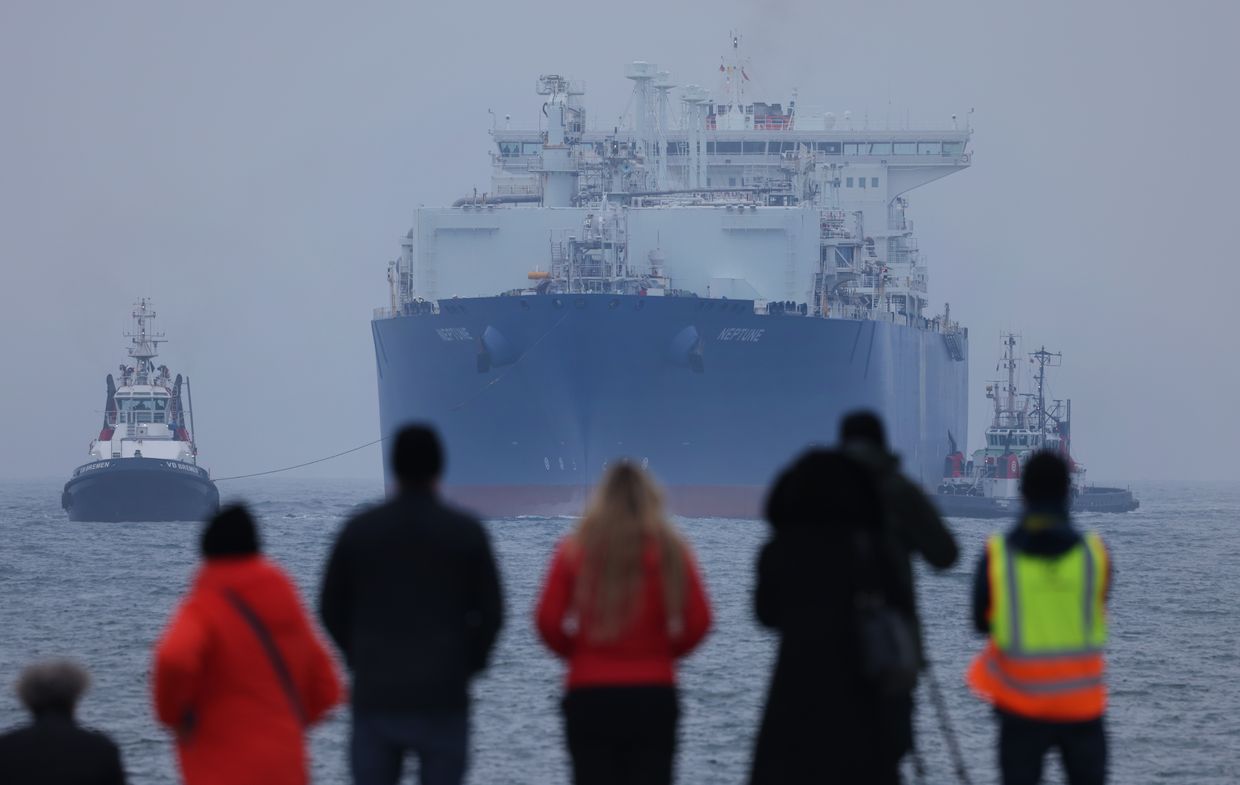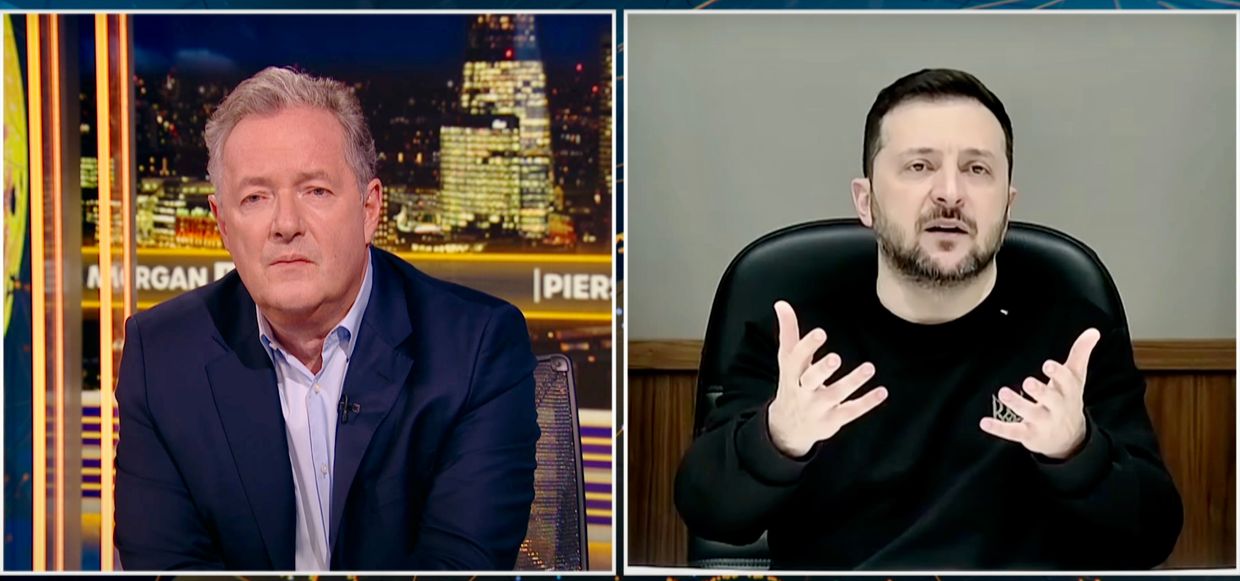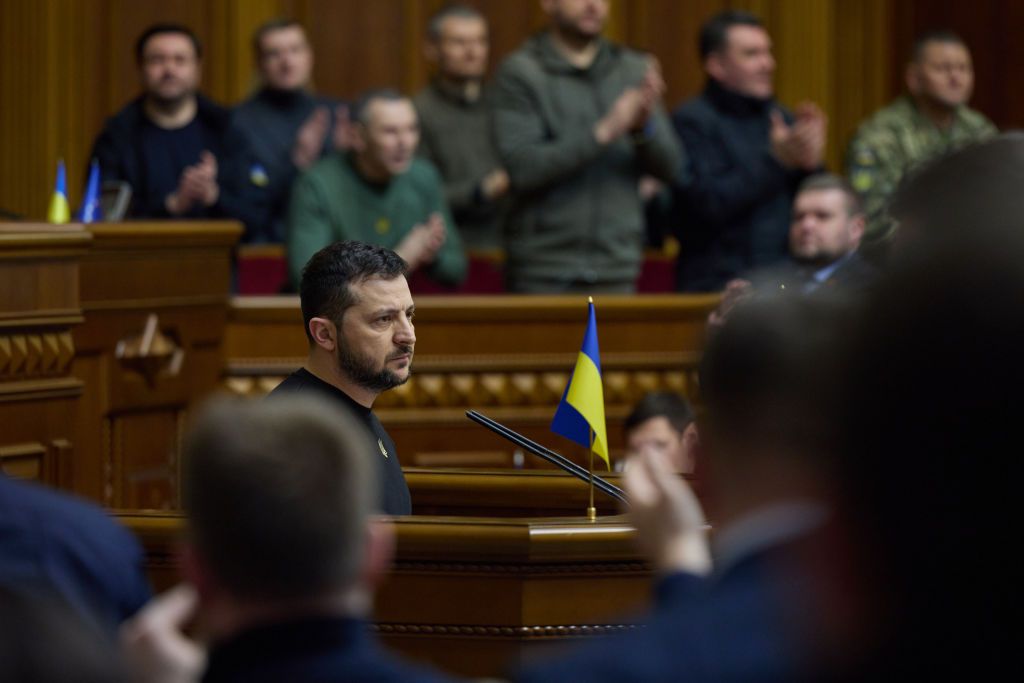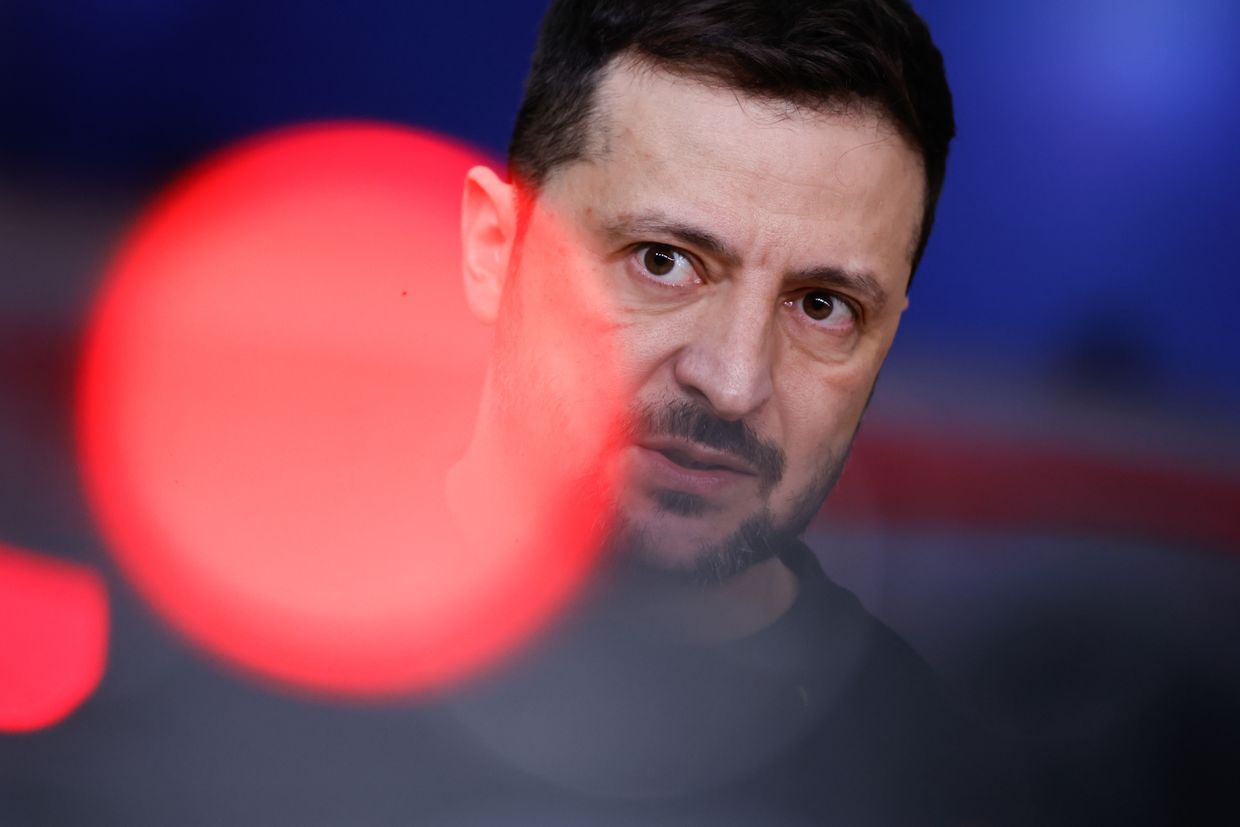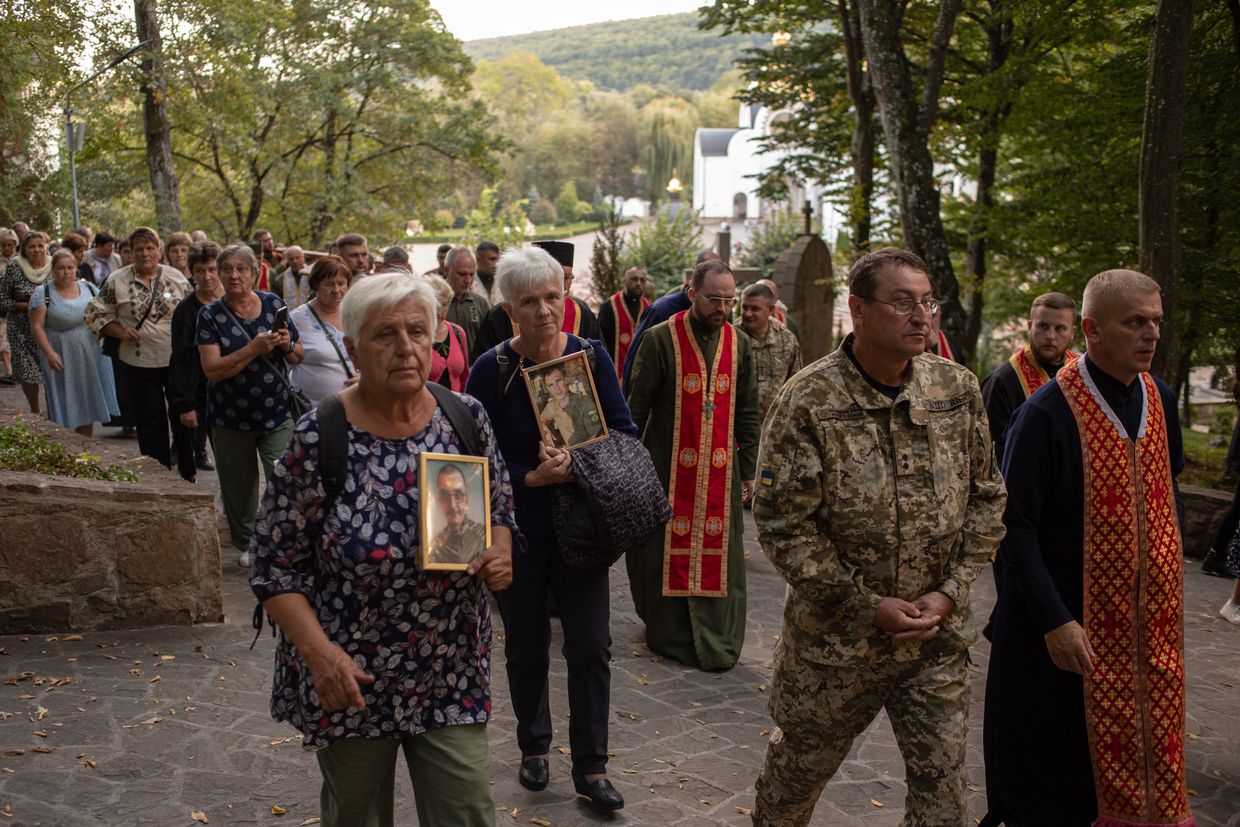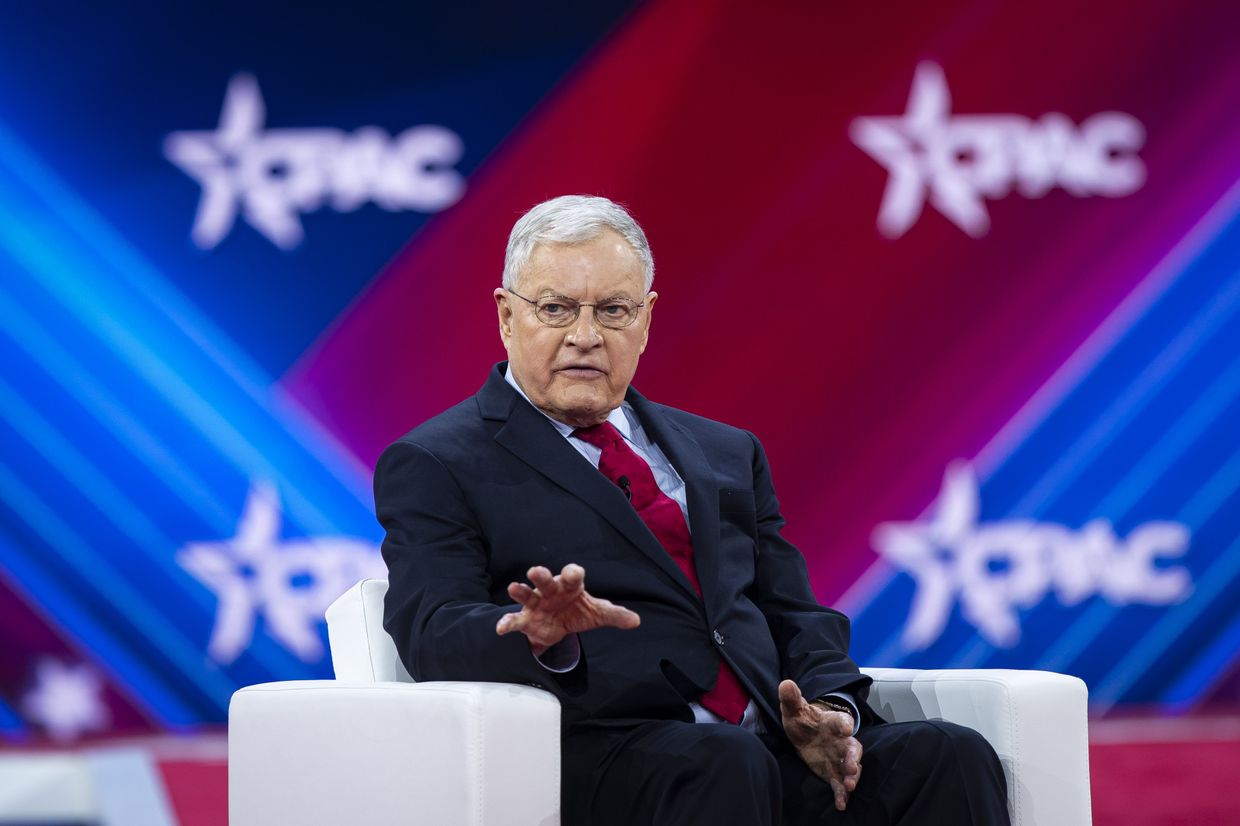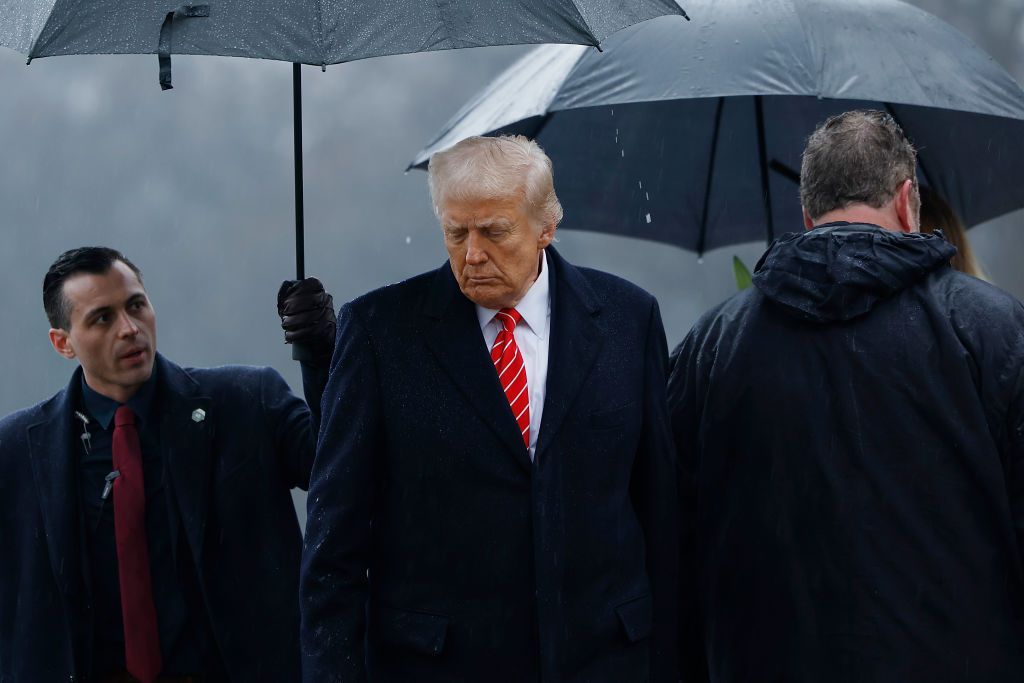As US and Russia start talks, what peace terms could Ukraine accept?

F-16 Fighting Falcons perform in the sky as President Volodymyr Zelensky delivers a speech on Aug. 4, 2024. (Ukrainian Presidency/Handout/Anadolu via Getty Images)
As diplomatic efforts between the U.S. and Russia have kicked off to end Moscow's war in Ukraine – without Kyiv at the table – it is becoming increasingly clear that Ukraine will most likely be pressured by Washington to make concessions to Russia.
U.S. President Donald Trump and his team have said in the past weeks that it is unrealistic to expect Ukraine to restore its 2014 borders after negotiations with Moscow.
They also said that NATO membership for Ukraine is off the table.
Ukraine will likely refuse to recognize any of the occupied territories as Russian de jure, reduce its army, legalize any openly pro-Russian political project, or officially abandon aspirations to join NATO, experts say.
Other clauses may be more palatable for Kyiv. These include a delay in NATO membership, freezing the current front line, holding elections, or exchanging Ukraine's foothold in Kursk Oblast for some part of Russian-occupied Ukraine. There may also be some compromise on “pro-peace parties” that do not openly back Russia, the status of the Russian language, and the Russian-backed Orthodox church in case it breaks ties with Russia, according to experts.
Yet, for Ukraine, it all comes down to making sure that Russia won't renew its invasion as soon as it sees an opportunity.
"The main question is how to deter Putin if he — should a truce agreement be reached, which I doubt — tries once again to seize a larger part of Ukraine's territory," said Oleksandr Merezhko, head of the Ukrainian parliament's foreign affairs committee.
"What could realistically stop him? In my opinion, only NATO membership," he added.
No recognition of Moscow's claims
Zelensky and several top U.S. officials, including Trump's Ukraine and Russia envoy Keith Kellogg and Vice President JD Vance, will attend the Munich Security Conference scheduled for Feb. 14-16. Zelensky is expected to meet both of them, according to the President's Office.
Kellogg is also expected to visit Ukraine on Feb. 20, while Trump said he is expected to meet with Zelensky soon, without providing the exact place and time of the proposed meeting.
The potential peace negotiations would be the number one topic on the list. Yet, regardless of what the U.S. officials could ask, there are a number of red lines that Ukraine would not cross.
Experts agree that Ukraine will likely not recognize any of the Russian-occupied territories as Russian de jure, while Russia will not cancel the illegal annexation of any of the territories that it claims in Ukraine.
"Recognizing the aggressor's claim over the occupied territories is unacceptable."
Russia illegally annexed Ukraine's Crimea peninsula in 2014, as well as the Kherson, Zaporizhzhia, Donetsk, and Luhansk oblasts in 2022. Despite this, Russia only partially controls the latter four regions it said it owns.
"There are two fundamental things that must not be compromised," Volodymyr Ariev, a lawmaker from the opposition European Solidarity party, told the Kyiv Independent.

"First, recognizing the aggressor's claim over the occupied territories is unacceptable. Second, we cannot accept limitations on our army, restrictions on the number of weapons, or any self-imposed constraints on forming military alliances. These two red lines must be set in stone. As for everything else, I think there is room to maneuver to some extent."
A freezing of the front line or an exchange of occupied territories without any change in their legal status is possible, according to experts.
"I think there will be a ceasefire along the line of contact at the time," Stefan Wolff, professor of international security at the University of Birmingham, told the Kyiv Independent. "There may be some adjustments and possibly a buffer zone. But I cannot see any major territorial changes or any formal recognition of the status quo."
Ukrainian political analyst Volodymyr Fesenko said that Ukraine could exchange its foothold in Russia's Kursk Oblast for the Russian-occupied part of Ukraine's Kharkiv Oblast.
Independent Russian political analyst Dmitry Oreshkin agreed, saying that "the Kursk factor is very important here" and that "exiting the war with part of his territory occupied by Ukrainian forces would be humiliating for Putin."
Zelensky has said he's open to an exchange.
Deploying European peacekeepers
The Telegraph reported in November that, under one of the peace plans being considered by Trump, he might call on European peacekeepers to enforce a buffer zone in Ukraine.
Experts say this is theoretically possible, but the proposal would face difficulties, and Russia will likely resist.
"To carry out military functions, there would have to be tens of thousands of personnel," Oreshkin said. "The West is unlikely to be enthusiastic about this idea because it would be an extremely expensive undertaking."
Jenny Mathers, a lecturer in international politics at the U.K.'s Aberystwyth University, said that "whether this is feasible or not will probably depend on the precise set of circumstances and restrictions in force."

"Putting peacekeeping forces in an area where military operations are still happening or at great risk of taking place would be asking for trouble," she added. "European governments are likely to be justifiably cautious."
The deployment of European peacekeepers to Ukraine is possible but definitely not the 200,000 number mentioned by Zelensky in January, Charly Salonius-Pasternak, lead researcher at the Center on U.S. Politics and Power at the Finnish Institute of International Affairs, told the Kyiv Independent.
In his most recent interview, Zelensky said that European activity on the ground must be backed by the U.S.
"There are voices which say that Europe could offer security guarantees without the Americans, and I always say no," Zelensky told the Guardian. "Security guarantees without America are not real security guarantees."
What will happen to Russian sanctions?
According to Kellogg's earlier proposals, the sanctions imposed on Russia would be partially lifted. But the crucial question for Ukraine is whether the lifting of the sanctions will be dependent on Russia's compliance with a potential ceasefire or peace deal.
Wolff said that "if there is a ceasefire, some gradual reduction of sanctions is likely."
"Unless sanction-lifting was done as part of a step-by-step process dependent on Russia taking meaningful steps to undo and make amends for the damage it has done to Ukraine and Ukrainians, Putin would simply pocket it as a win and carry on to do as he wished," Mathers said.
Delaying Ukraine's NATO membership
According to a peace plan co-authored by Kellogg in early 2024, Ukraine's NATO accession would be taken off the table for an extended period.
Ukraine has sought to join the alliance since the early 2000s and officially applied for NATO membership in 2022. Ukraine's intention to join the alliance is included in its constitution.
However, the bloc has been reluctant to admit Ukraine. Since NATO is not currently agreeing to Ukraine's accession anyway, a clause on a delay in NATO membership would not change much, experts say.
"NATO has already effectively delayed the question of Ukraine's membership until some indefinite point in the future," Mathers said.

Ariev said that a decision on whether to delay NATO membership is up to the alliance, not Ukraine, and Kyiv cannot "force its way in."
However, Russia has demanded not just delaying Ukraine's NATO accession but requiring Kyiv to officially abandon the goal of NATO membership and become a neutral state. Experts and lawmakers say that Ukraine is highly unlikely to accept this demand.
"Ukraine's NATO membership is a strategic goal, and Ukraine must stand its ground on this matter at all costs," Ariev said.
Merezhko agreed, saying that "under no circumstances should Ukraine abandon its goal of joining NATO, as it is the best guarantee of our security and survival."
Security guarantees for Ukraine are key
Since NATO accession is unlikely in the near future, a lot depends on whether the West will provide any tangible security guarantees for Ukraine. Kellogg's plan envisages security guarantees for Ukraine but does not elaborate on them.
"There could be a security agreement with the U.S.," Fesenko said. "It should be ratified by the U.S. Congress so that it becomes a full-fledged treaty — at least something similar to the agreements that (the U.S. had with) Israel and Egypt."
Ariev said that a genuine security guarantee would be a bilateral treaty similar to the "Taiwan Relations Act, which is part of U.S. legislation and obliges the United States to provide military assistance to Taiwan in the event of aggression."
Despite that, even a bilateral defense pact with the U.S. doesn't guarantee that Ukraine would receive anything more than military aid. JD Vance made it clear, saying on Feb. 11 that the U.S. would not be sending troops to Ukraine and that the heavy lifting should instead be done by Europeans.
"(Military aid for Ukraine) depends on whether Putin overplays his hand and Trump gets more frustrated seeing Russia as the main obstacle to a deal."
Instead, Zelensky has said that Kyiv does not see any security agreements as having real weight unless they include U.S. backing.

According to Kellogg's proposals, the U.S. will continue sending military aid to Ukraine to Kyiv to prevent further Russian aggression.
Kellogg's proposals stipulate that the U.S. would cease military aid to Ukraine if it does not agree to hold peace negotiations. On the other hand, the U.S. would increase its military support for Ukraine if Russia refuses to accept a peace deal.
"(Military aid for Ukraine) depends on whether Putin overplays his hand and Trump gets more frustrated seeing Russia as the main obstacle to a deal," Wolff said.
Holding elections in Ukraine?
Kellogg told Reuters in a Feb. 1 interview that the U.S. wants Ukraine to hold elections, potentially by the end of the year, especially if Kyiv can agree to a truce with Russia in the coming months.
Under the martial law act passed by Ukraine after Russia launched its full-scale invasion on Feb. 24, 2022, presidential, parliamentary, and local elections are banned. Elections can only be held after martial law is lifted.
Experts say that elections are a realistic scenario if there is a ceasefire, and if martial law is canceled, but not before a ceasefire.
Over 7 million Ukrainians have left Ukraine as a result of Russia's war and are now living abroad. Another 4.5 million are internally displaced. In total, that's around a third of the country's entire population.
With around 20% of Ukraine's territories occupied by Russia, "millions more" remain in the Russian-occupied territories, according to Zelensky.
Furthermore, the infrastructure required for elections to take place has been destroyed in multiple settlements across the country.
"These multiple problems simply mean that talks about elections are too early," said Oleksandr Salizhenko, editor-in-chief of the political watchdog Chesno.
Russian church and political projects
At least publicly, the Kremlin has pushed for lifting Ukraine's ban on pro-Russian parties, which was introduced in 2022 due to Russia's full-scale invasion.
Experts and lawmakers say that Ukraine is unlikely to agree to allow parties that openly advocate for Russia and its agenda.
"The people will never support such parties," Merezhko said. "I can't imagine how this could be politically possible, for example, to lift the ban on the (Russian-linked) Opposition Platform-For Life party or the Party of Regions. It's impossible."
Fesenko said that "allowing them to participate in elections would cause massive resistance."
But if the wording applies to “pro-peace parties” that do not openly back Russia, a compromise is possible, experts say.
The “pro-peace” label has been extensively used by Russian-linked political projects, framing those who oppose Russia and its war as being “pro-war.”
"What they might do is to formulate it differently — that parties participating in elections can represent the interests of various ethnic and linguistic groups," Fesenko said.
The Kremlin has also pushed for lifting restrictions on the Russian-backed Orthodox church in Ukraine.
In August 2024, Ukraine passed a law to ban religious organizations affiliated with Russia. Such organizations can break ties with Russia within nine months, and the ban will come into effect if they fail to do so.

Experts are divided on whether Ukraine may make concessions to Russia on the status of the Russian-backed Orthodox church.
"I can't imagine this because people will never accept such changes," Merezhko said. "Everything related to Russia is toxic. The Russian Orthodox Church is a weapon for Russia. Its legalization would be the legalization of a subversive Russian organization."
The Russian Orthodox Church had been directly involved in Russia’s war against Ukraine, supporting the attacks committed by the Russian Armed Forces. Patriarch Kirill has said Moscow is waging a “holy war” against Kyiv.
However, Fesenko argued that, regarding the Russian-backed church, "it may be possible to find some kind of compromise wording."
He said that the law stipulates "breaking official ties with aggressor countries," and "a formulation can be found" to address this issue — such as the Russian-backed church's formal independence from Moscow.
Status of the Russian language in Ukraine?
Russia may also demand an official status for the Russian language. Ukrainian is currently the only official language in Ukraine, but the constitution guarantees the protection of Russian and other minority languages.
Under pro-Russian President Viktor Yanukovych, Ukraine passed a law granting Russian and other languages official minority status in certain regions in 2012. However, the Constitutional Court deemed the law unconstitutional in 2018 and repealed it.
Merezhko said that he could not imagine granting Russian official status alongside Ukrainian, while Ariev said he believed the existing constitutional protection of the Russian language was sufficient.
Fesenko argued that the status of an official state language for Russian is unlikely but a certain other status for the Russian language can be discussed.
Reducing the Ukrainian army
One of Russia's demands that would be unacceptable to Ukraine is so-called "demilitarization" — a unilateral decrease in the number of Ukrainian army personnel.
"Moscow would, of course, be delighted with this outcome and has been pushing for Ukraine to be limited to a military that would be mostly symbolic and totally unable to defend the country from further attacks by Russia," Mathers said. "Without serious security guarantees, however, I cannot see Kyiv agreeing to such a measure."

Fesenko argued that the only way this would be palatable for Ukraine is to impose similar restrictions on both the Ukrainian and Russian armies.
"For economic and demographic reasons, they'll both have to (reduce the size of the army)," Wolff said. "But I am not sure that either side will accept legally binding upper limits."
Merezhko argued that "Putin can agree only to such ceasefire conditions that would allow him to attempt again, after some time, to capture Kyiv and destroy Ukrainian statehood."
"That is the problem," he added. "Ukraine's and Putin's goals are diametrically opposed, leaving no common ground for negotiations."

